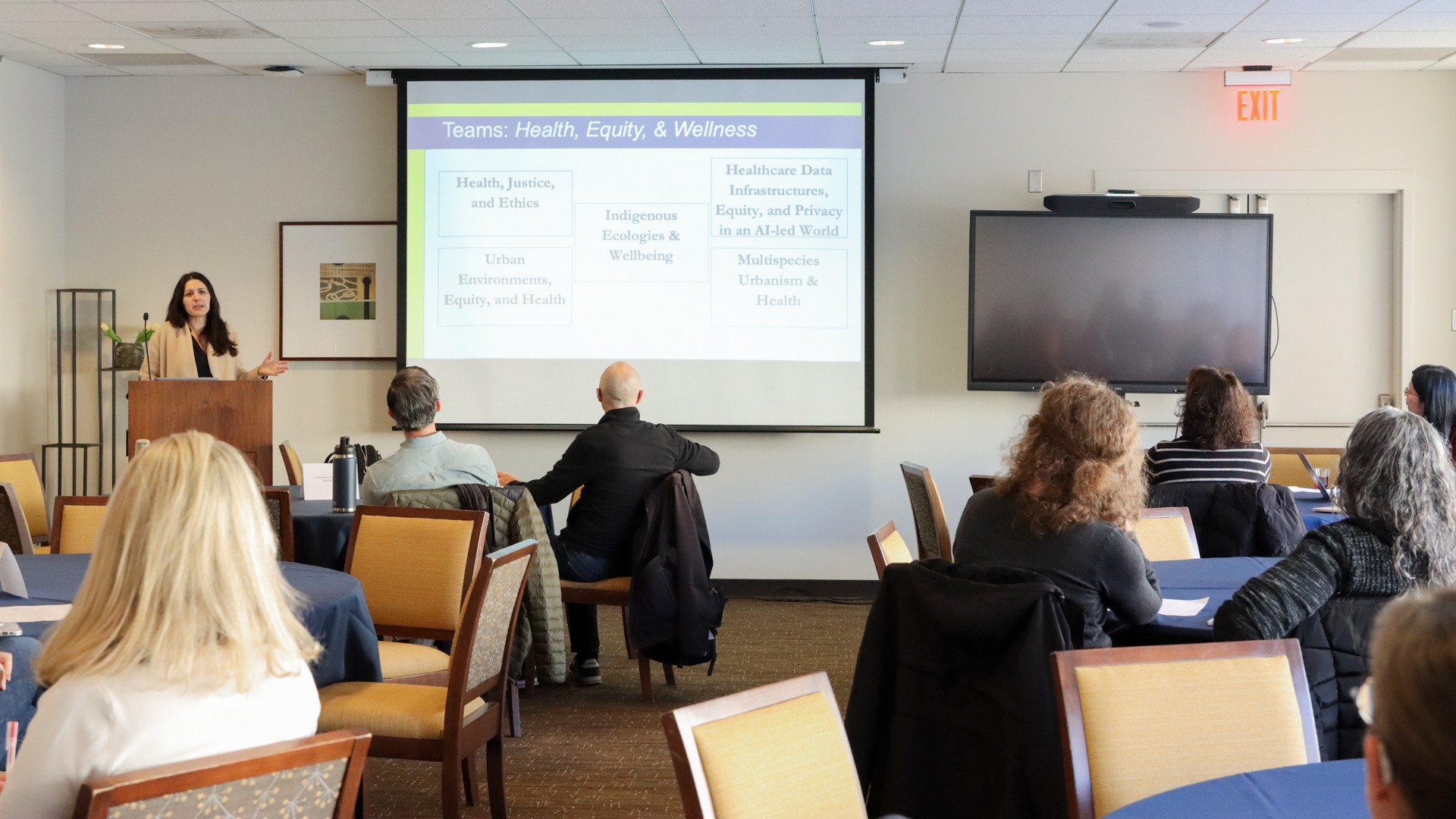College of Arts and Sciences Launches Innovation Incubator for Faculty Collaboration

Associate Dean for Research Evangelia Chrysikou, PhD, introduces the teams during the Arts and Sciences Innovation Incubator kickoff event in January.
March 7, 2024
The College of Arts and Sciences recently introduced a new initiative to bolster faculty collaboration across departments and disciplines. The Arts and Sciences Innovation Incubator brings together faculty members in diverse areas of expertise to collaborate on research projects that find creative ways to address some of our society’s most challenging obstacles.
“The Arts and Sciences Innovation Incubator was designed to facilitate interdisciplinary activity and foster a more dynamic approach to research and scholarship,” explained College of Arts and Sciences Dean David S. Brown, PhD. “By breaking down traditional silos and encouraging cross-disciplinary collaboration, our faculty can inspire students to think critically, engage in creative problem-solving and develop a broader perspective that extends beyond the confines of a single discipline.”
The Arts and Sciences Innovation Incubator kicked off in January when the inaugural cohort of faculty members came together to begin a dialogue about their projects, which focus on various topics surrounding health, equity and wellness. Each research team will meet bimonthly through August 2024 to discuss their projects and will work to secure external funding opportunities to further develop their ideas into solutions.
“The Arts and Sciences Innovation Incubator is a truly exciting initiative sure to inspire creativity and new collaborations across the College—in a way that has never happened before,” said Associate Dean for Research Evangelia Chrysikou, PhD. “We hope that the program will serve as a catalyst and inspiration for collaborative research across Drexel. I look forward to learning more about the exciting projects of the inaugural cohort of participants!"
Learn more about the teams and their projects below.
Health, Justice and Ethics
Mercer Gary, PhD – English and Philosophy
Naomi Goldstein, PhD – Psychological and Brain Sciences
Amanda NeMoyer, JD, PhD – Psychological and Brain Sciences
Kathleen Powell, PhD – Criminology and Justice Studies
C. Clare Strange – Criminology and Justice Studies
The Health, Justice and Ethics team will use an ethical lens to explore the intersections of justice, health and equity. Areas of inquiry will likely include examining policies or practices that aim to improve outcomes for young people involved with the justice system.
Urban Environments, Equity and Health
Richardson Dilworth, PhD – Politics
Steve Vásquez Dolph, PhD – Global Studies and Modern Languages
Jordan Hyatt, JD, PhD – Criminology and Justice Studies
Alexis Schulman, PhD – Biodiversity, Earth and Environmental Science
The Urban Environments, Equity and Health team will examine the impact of large institutions on land use patterns and urban health in environmentally and economically vulnerable communities. The project will focus on St. Christopher's Hospital for Children, situated at the intersection of the Kensington, Feltonville and Hunting Park sections of Philadelphia.
THETA: Transforming Health Equity and Trust in an AI world
Mary F.E. Ebeling, PhD – Sociology
Emmanuel Koku, PhD – Sociology
Hilde Van den Bulck, PhD – Communication
Jennifer Yusin, PhD – English and Philosophy
The THETA team will use their combined research interests to explore various components of artificial intelligence that relate to health systems and their impact on practitioner-patient relationships. One key focus of their project is the issue of diversity, equity and inclusion and how it relates to social capital. Another key focus is on trust, including how trust is built into these platforms and is also an outcome of trustworthy systems.
Indigenous Ecologies and Wellbeing
Aaron Kucyi, PhD – Psychological and Brain Sciences
Alberto Morales, PhD – Global Studies and Modern Languages
Andrew Smith, PhD – Biodiversity, Earth and Environmental Science; English and Philosophy
The Indigenous Ecologies and Wellbeing group will develop a study regarding issues of mental health and wellbeing of Indigenous immigrants from Latin America to the United States and/or Canada. Indigenous immigrants are often lumped in with Latino immigrants in such assessments, despite being culturally and linguistically distinct. The team intends to consider specific forms of relational and ecological displacement that adversely affect Indigenous immigrants’ mental health and wellbeing to determine what interventions and forms of support they may require.
Multispecies Urbanism and Health
Christian Hunold, PhD – Politics
Monica Ilies, PhD – Chemistry
Megan Phifer-Rixey, PhD – Biology
Shelby Rinehart, PhD – Biodiversity, Earth and Environmental Science
Zoe Zhang, PhD – Psychological and Brain Sciences
The Multispecies Urbanism and Health team will take a multidisciplinary approach to addressing concerns surrounding human-wildlife interactions in urban spaces. Cities bring people and wildlife together. Recognition of urban biodiversity and of cities as sites of rich human-wildlife interactions has given rise to multispecies urbanism. This approach to urban planning and design recognizes that human and nonhuman animal health and wellbeing are closely intertwined. Interactions between humans and other life forms in urban ecosystems are influenced by a set of social, cultural, and political factors linked to infrastructure development, material flows, and governance structures. The team seeks to conduct and support multispecies urbanism research that will benefit the health and safety of humans and their wild animal neighbors in the City of Philadelphia.